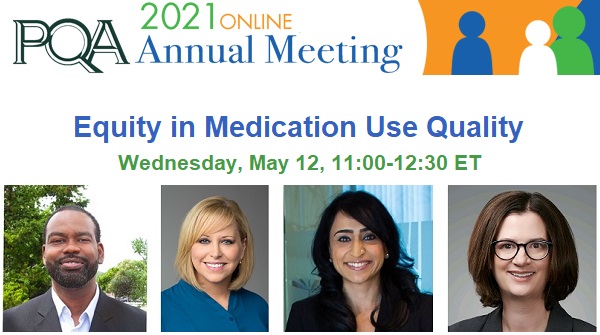PQA is committed to patient-centered principles, including health equity, in our work to improve medication safety, adherence and appropriate use.
Our commitment is on display next Wednesday, May 12, in our Annual Meeting general session on “Equity in Medication Use Quality.” We will hear directly from Deen Allen, an African American man and multiple sclerosis patient on the challenges he faced to receiving appropriate diagnosis and medication therapies.
 Deen’s story is one of hope and success. A research chemist by training, he was able through perseverance to navigate and overcome numerous barriers within the health care system, to get the right diagnosis and begin effective treatment. You can read more about Deen’s story from Creaky Joints.
Deen’s story is one of hope and success. A research chemist by training, he was able through perseverance to navigate and overcome numerous barriers within the health care system, to get the right diagnosis and begin effective treatment. You can read more about Deen’s story from Creaky Joints.
Not every patient enjoys the positive outcomes that Deen has achieved. His message and advocacy provide us a renewed opportunity to think critically about how care delivery and quality improvement programs are designed, so that all patients have a fair opportunity to experience good outcomes.
In the shift to value-based care, shared decision making and consumer-driven care, the patient’s perspective must be front and center. How do they think about and approach care? What do they need and what health outcomes do they want?
The answers matter because you need the patient’s understanding, commitment and action to realize higher levels of adherence, greater satisfaction and improved outcomes.
Beyond these universal questions there are other patient-centered issues related to inequities in the U.S. health care system, including in the use of medications, that must be addressed.
What are the barriers that lead to unfair and avoidable differences in health outcomes and how can we remove them?
Deen’s session will approach these questions. In addition to his lived experience, we’ll hear insights from Lori Hall, the Director of Global Health Literacy at Lilly. Their chat, moderated by PQA Education Director Amanda Ryan, is followed by a presentation by Sharon Jhawar, a PQA Board member and Chief Pharmacy Officer at SCAN Health Plan. Jhawar will share insights on SCAN’s program to better address medication adherence among members of different racial and ethnic groups from various perspectives.
I look forward to learning and engaging, guided in part by the patient perspective.
Beyond this year’s Annual Meeting, here are some of the ways PQA is elevating the patient in our work:
- We have enhanced patient engagement in our Measure Development Process. Patient partners now serve on all our development groups and panels, so that our work is informed by individuals with related lived experience.
- Patient engagement is one of PQA’s four research focus areas. In 2019, PQA developed a rubric to help meaningfully include the patient community as a partner across the quality measure lifecycle.
- Our 2020 Leadership Summit on the social determinants of health included a stakeholder panel with insights from Libby Hoy, Founder and Patient Family Advisor, PFCCpartners.
- Our 2020 Annual Meeting had a general session on The Patient Perspective in Healthcare Quality featuring Suzanne Schrandt, JD, CEO, & Chief Patient Advocate, of ExPPect.
We welcome your feedback and insights on our work in medication use quality and efforts to ensure the patient’s voice is effectively included. Email us at [email protected].
